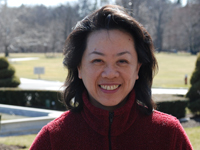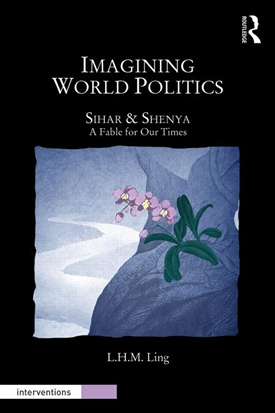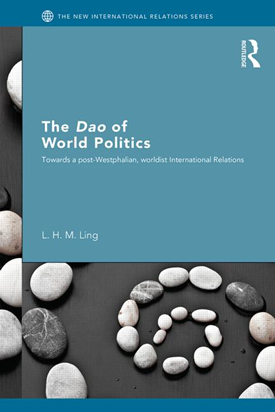Introducing L.H.M. Ling
 L.H.M. Ling was Associate Dean for Faculty Affairs at the New School for Public Engagement (NSPE) at the time of the interview. Moreover, she was Professor at the Milano School of International Affairs, Management, and Urban Policy of the New School. Dr Ling obtained a BA at Wellesley College (1979) and an MS (1982) and PhD (1989) at the Massachusetts Institute of Technology. For more information about Professor Ling, please read this Obituary on behalf of the Faculty & Staff on the website of the New School.
L.H.M. Ling was Associate Dean for Faculty Affairs at the New School for Public Engagement (NSPE) at the time of the interview. Moreover, she was Professor at the Milano School of International Affairs, Management, and Urban Policy of the New School. Dr Ling obtained a BA at Wellesley College (1979) and an MS (1982) and PhD (1989) at the Massachusetts Institute of Technology. For more information about Professor Ling, please read this Obituary on behalf of the Faculty & Staff on the website of the New School.
She has authored four books:
- Postcolonial International Relations: Conquest and Desire between Asia and the West (2002)
- Transforming World Politics: From Empire to Multiple Worlds (co-authored with A.M. Agathangelou, York University, 2009)
- Imagining World Politics: Sihar & Shenya, A Fable for Our Times (2014)
- The Dao of World Politics: Towards a Post- Westphalian, Worldist International Relations (2014)
This interview is about the last book.
My New Book In 750 Words
1. What are the main themes of the book?
 The Dao of World Politics aims for a more democratic, sustainable world politics. It draws on Daoist yin/yang dialectics to move world politics from the current stasis of hegemony, hierarchy, and violence to a more balanced engagement with Others through parity, fluidity, and ethics.
The Dao of World Politics aims for a more democratic, sustainable world politics. It draws on Daoist yin/yang dialectics to move world politics from the current stasis of hegemony, hierarchy, and violence to a more balanced engagement with Others through parity, fluidity, and ethics.
The book also focuses on those aspects of world politics usually erased or overlooked by conventional International Relations (IR) – e.g., folk tales and popular culture – and how these affect/ inform/ underpin supposedly objective, rational policy analysis.
The book, in effect, turns a non-Western gaze onto Western/Westphalian IR. But it does not reject or exclude the latter. Rather, the book adheres to what the dao teaches: nothing ever stays the same and yet everything emanates from this eternal truth. Accordingly, this book suggests new ways of articulating and acting in global politics so that it is more inclusive and less coercive. Only then, the book claims, could IR realize what the dao has always stood for: a world of compassion and care.
The Dao of World Politics bridges the humanities and social sciences, and will be of interest to scholars and students of the global/international, as well as policymakers and activists of the local/domestic.
2. What are the central questions of the book?
How do we overcome the hegemony of the West in contemporary world politics? And how do we do so without reproducing another hegemony?
3. How have you sought to answer these questions?
 Daoist dialectics offer a way out of hegemony by perforating its binaries (e.g., Self vs Other, West vs Rest, Order vs Chaos). Daoist dialectics begin with two oppositional conditions: yin vs yang. Yin represents the “female” principle (dark, cold, soft); yang, the “male” principle (bright, hot, hard).
Daoist dialectics offer a way out of hegemony by perforating its binaries (e.g., Self vs Other, West vs Rest, Order vs Chaos). Daoist dialectics begin with two oppositional conditions: yin vs yang. Yin represents the “female” principle (dark, cold, soft); yang, the “male” principle (bright, hot, hard).
But yin and yang do not stay opposed since Daoist dialectics also recognize that each exists within the other: i.e., yin-within-yang and yang-within-yin (see image on the right here). From this basis, we can see how change can take place without resort to violence to the Other. To do so, after all, would harm the Self.
4. What are the main findings of your book?
A new mode of engagement between Self and Other called Worldist Dialogics. It proposes a method of discourse called Creative Listening and Speaking (CLS).
5. What does the book contribute to existing literature in the field?
 The book contributes a way of thinking and doing, being and relating that stems from a non-Western, non-modern source – Daoist dialectics – but which holds the promise of taking world politics forward to a post-Western future beyond the constraints of modernity.
The book contributes a way of thinking and doing, being and relating that stems from a non-Western, non-modern source – Daoist dialectics – but which holds the promise of taking world politics forward to a post-Western future beyond the constraints of modernity.
6. How does the book relate to your own (personal/professional) background?
I am a product of both East and West. Growing up in this hybrid space has allowed me to see the possibilities and drawbacks of both traditions; accordingly, the best way to proceed is to syncretize the best of both worlds, thereby leaving behind the worst of each.
7. What further research into the book’s themes would you suggest?
I am currently working on a follow-up volume titled, A Worldly World Order. It will look specifically at how we can bridge supposedly irreconcilable theories in IR – like realism and a pre-modern, indigenous worldview like the Andean cosmovision – to arrive at a more dialogical and democratic world politics.
